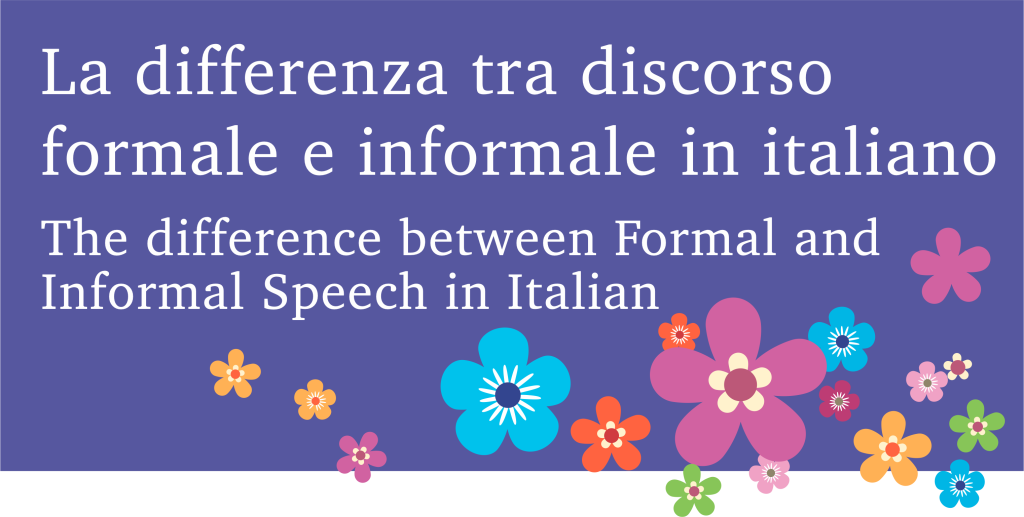

La principale differenza tra discorso
formale e informale in italiano:
The main difference between formal and
informal speech in Italian:
Il tono di voce uilizzato
The tone of voice that is used
Il pronome utilizzato
The pronoun that is used


Formal Tone
Il tono di voce usato nella forma formale italiano è generalmente più serio e gentile. Viene utilizzato con professionisti, colleghi, professori, persone anziane e persone che non conosci o hai appena incontrato. Quando ti rivolgi a qualcuno formalmente, permette a due persone di stabilire confini educati e mantiene la distanza tra le due persone per mostrare rispetto.
The tone of voice used in the formal Italian form of address is generally more serious and polite. It is used with professionals, colleagues, professors, older individuals, and people you do not know or have just met. People for whom you have great respect. When you address someone formally, it allows two people to establish polite boundaries and keeps distance between the two people to show respect.


Informal Tone
D’altra parte, la forma informale di rivolgersi alle persone è generalmente leggera, emotivo e amichevole. Implica un livello di intimità con l’altra persona. È usato con i membri della famiglia, i bambini, gli amici, i conoscenti di lunga data, le persone anziane che hai conosciuto tutta la tua vita e i tuoi animali domestici.
On the other hand, the informal form of addressing people is generally light-hearted, casual and friendly. It implies a level of intimacy with the other person. It is used with family members, children, friends, long-time acquaintances, people your age, and your pets.

The pronoun that is used
È MOLTO IMPORTANTE ricordare che il pronome che usi è diverso quando ti rivolgi alle persone in modo formale o informale. In inglese, usiamo sempre “tu” quando parliamo con le persone, quindi questo concetto è difficile da comprendere all’inizio. Tuttavia, in italiano, è necessario utilizzare uno dei seguenti pronomi, ed è fondamentale, e può essere irrispettoso se non usato correttamente. (*vedi un suggerimento alla fine del post per evitare per evitare guai.).
It is VERY IMPORTANT to remember the pronoun that you use is different when you address people formally or informally. In English, we always use “you” when we talk to people whether formally or informally, so this concept is hard to comprehend at first. However, in Italian, you must use one of the following pronouns, and it is crucial, and it can be very disrespectful if not used correctly. (*see the tip at the end of the post to help get you out of hot water).
È facile ricordare il modo informale di rivolgersi alle persone
It is easy to remember the informal way of addressing people
Linguaggio informale: il pronome usato — Tu : second person singular
Per gli stranieri è un po’ più difficile ricordare come usare il modo formale di parlare
For foreigners, it is a little more tricky to remember how to use the formal way of speaking
Linguaggio formale: il pronome usato — Lei : third person singular, spelled with a capital “L”
In formal speech the pronoun used to refer to a single MAN or a single WOMAN is the “Lei” — similar to third person singular conjugation of “lui, lei” (he, she). You will often see the single person conjugation charts written to include all three in this way: lui, lei, Lei.
io vado = I go
tu vai = you go
lui, lei, Lei va = he, she, YOU (POLITE) go
noi andiamo = we go
voi andate = you all go
loro vanno = we go
io sono = I am
tu sei = you are
lui, lei, Lei è = he, she, YOU (POLITE) is
noi siamo = are
voi siete = are
loro sono = are
Note: this may be confusing at first. The formal expression “Lei” spelled with a capital letter “L” should not be confused with “lei” spelled with a small letter “l”. Lei = “you” formal vs. lei = “she.”
Both the formal pronoun Lei (you formal, man or woman) and lei (she) take the same verb form and address one person.
ESEMPI / EXAMPLES
When you ask someone “How are you?”
Formally, you would say: Come Sta, Lei?
Informally, you would say: Come stai, tu?
When you bump into someone on the street, on the bus, or in a store, you apologize by saying:
Scusi (Formal)
Scusa (Informal)
When you introduce yourself, you say:
Come si chiama, Lei? (Formal) What’s your name?
Come ti chiami, tu? (Informal)

Quando ti diventi amichevole con qualcuno e sei pronto per fare il passaggio da parlare formalmente a informalmente come tu fai questo?
When you become friends with someone and are ready to make the switch from speaking formally to informally how do you do this?
Tu chiedi all’altra persona questa:
You ask the other person this:
“Possiamo darci del tu?” (Can we switch to the “tu” form.)
“Diamoci del tu?” (Can we give each other the “tu” form now?)
“Mi puoi dare del tu?” (Do you want to use the familiar form with me?)
Ma ricordate… una volta che sei passato al modo informale, non puoi tornare indietro!
But, remember… once you’ve switched to the informal way, there’s no going back!
*Tip: When you are in Italy in a bar, restaurant, or shop, if you are worried you will confuse the formal and informal modes of address, introduce yourself, explain you are learning the language, and apologize for any errors that you might make in advance confusing the “tu” and the “Lei” form. The Italians will be pleased you are aware of the difference and to help you overcome any difficulties you may have, they may even invite you to use the “tu” with them to alleviate your stress. Italians are very kind that way!












Regarding confusing Lei and tu, if you have enough knowledge of the Italian language to introduce yourself, explain you are learning the language, and apologize for any errors that you might make in advance, you should not have a problem 😀